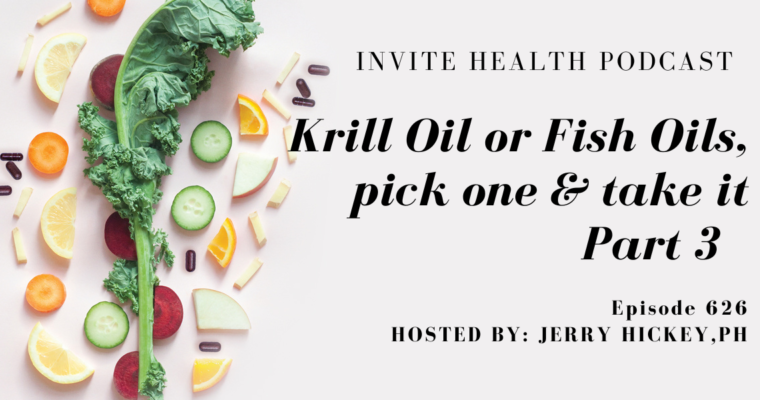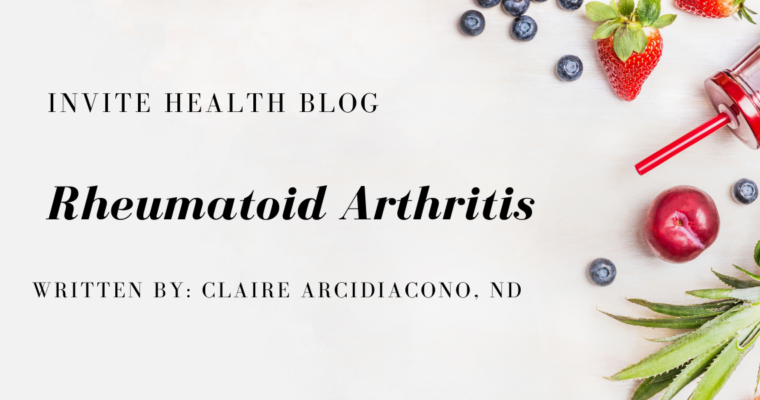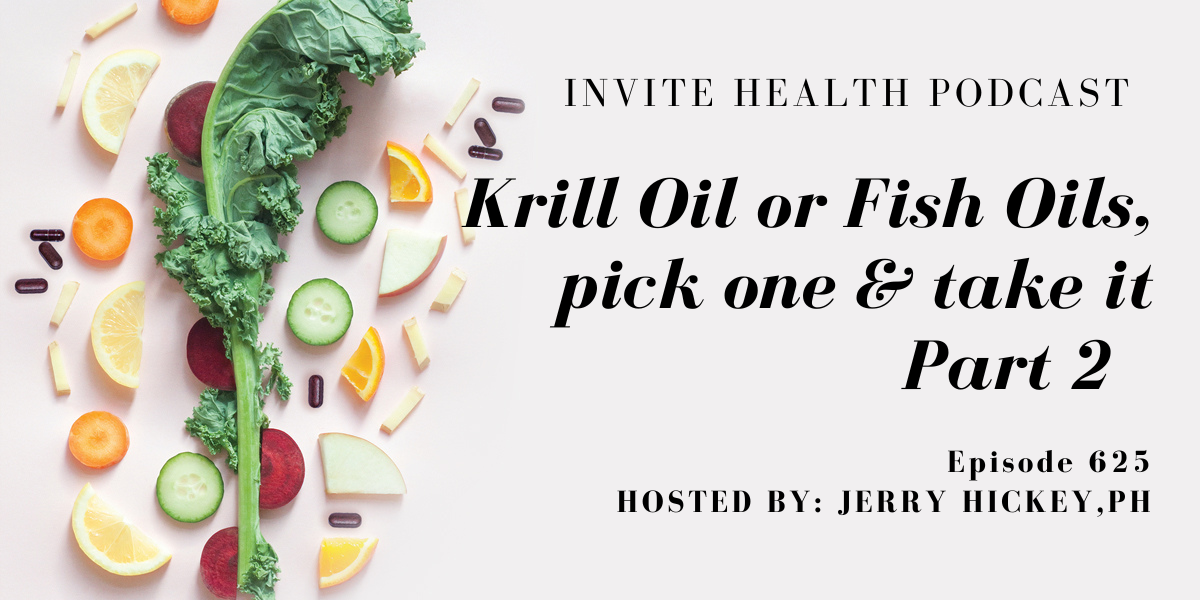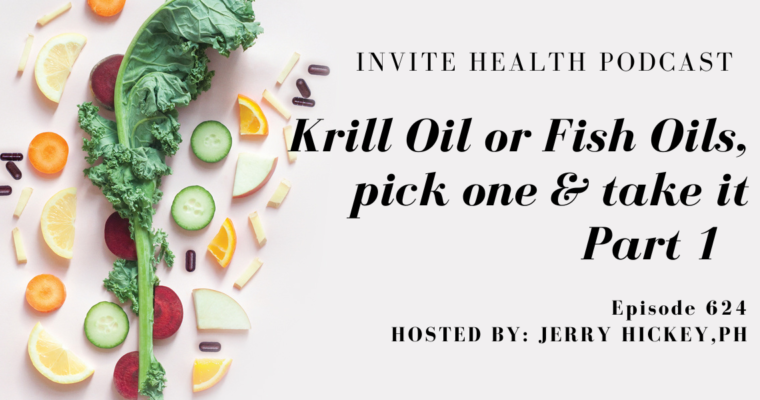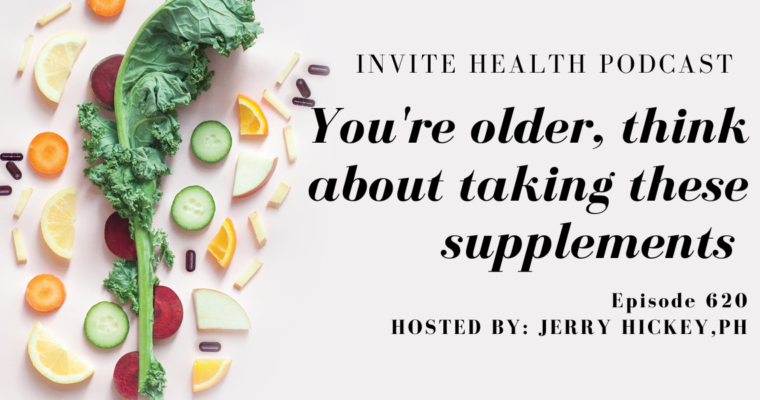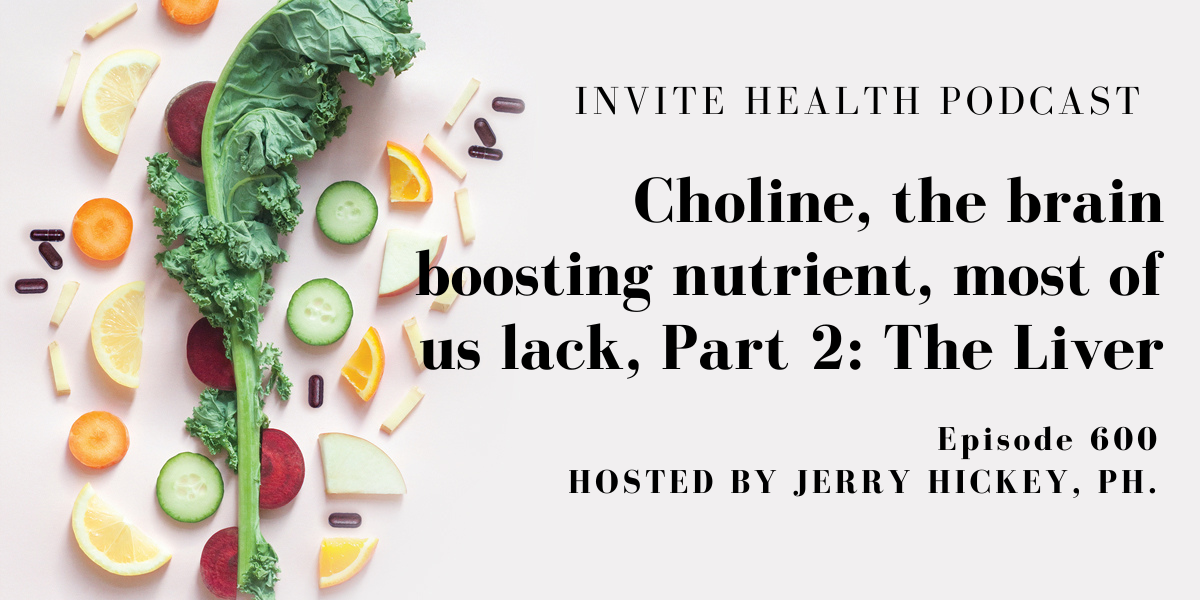Subscribe Today!
Please see below for a complete transcript of this episode.
CHOLINE, THE BRAIN BOOSTING NUTRIENT,90% OF US LACK-Part 2, INVITEⓇ HEALTH PODCAST, EPISODE 600
Hosted by Jerry Hickey, Ph.

InViteⓇ Health Podcast Intro: [00:00:04] Welcome to the InVite Health podcast, where our degreed health care professionals are excited to offer you the most important health and wellness information you need to make informed choices about your health. You can learn more about the products discussed in each of these episodes and all that InVite Health has to offer at, www.invitehealth.com/podcast. First time customers can use promo code podcast at checkout for an additional 15% off your first purchase. Let’s get started.† [00:00:34]
Jerry Hickey, Ph: [00:00:41] Hi, Jerry Hickey here. Welcome to part two of our episode Choline, the brain boosting nutrient 90% of us lack, we’re just not getting it in our diet. And I started the first part of this episode, this broadcast and that it’s rather amazing that this nutrient which is needed for your memory to function, for your muscles to function, for your nerves to function, for learning, for problem solving, for paying attention. Most of us are lacking, a recent review by the National Institutes of Health, 90% of all American adults and children fail to consume enough choline, so 10% of us get enough Choline, so in any event, today we’ll review very quickly where Choline is and the first part of this episode, I discussed how much you need and food sources, etc., and I said, Krill is a dependable source. It’s a very good source of Choline, because it gives it in a favorite form, which is phosphatidylcholine, which is absorbed very well into the liver and into your brain and into your nerves and heart, and everything is very healthy thing because most of our cell, all of our cells require Choline, all of our cells require phosphatidylcholine, so Krill is your phosphatidylcholine. So even though you can get Choline from the diet, a lot of the foods that contain Choline, people are not consuming like organ meats, you know, like liver, egg yolks, etc. So if you do two krill a day, it’s a high quality krill, you’re getting phosphatidylcholine, the preferred form of Choline.† [00:02:13]
[00:02:15] So welcome to my episode, Choline, the brain boosting nutrient, 90% of us are lacking. My name is Jerry Hickey, I’m a nutritional pharmacist. By the way, it’s always an honor and a privilege to be speaking with you. You can find all of the Invite podcast episodes wherever you listen to podcast for free or just go to Invitehealth.com/podcast or please subscribe and leave a review. That’s very helpful for us. We know where we’re going with that. Also, you can find Invite on Instagram and Facebook and Twitter at InVite Health. All of the information on this episode is linked at the description and the website or wherever you’re listening. So let’s get going. Choline is an essential, important, incredibly important nutrient, incredibly important nutrient. It’s not only connected with B vitamins, if you lack Choline, your brain doesn’t work well. If you lack Choline, your liver is going to be really a problem. You’re really going to have liver problems. And that’s what we’re going to focus on in this, in this episode. But first, let’s, let’s just discuss quickly, Choline in the brain. I describe the study in part one of the episode, but a quick review. Not everybody listens to both episodes, which is a shame for me. It’s part of the Copeo of Finland Ischemic Heart Disease Risk Factor Study. So it’s a large study, it’s an ongoing study. And they’re looking at almost 2500 men between the age of 42 to 60 that were enrolled in the study starting in 1984. These men were brain healthy. They didn’t have strokes. They didn’t have dementia. Now, four years after they were enrolled in the study, they were given a battery of five cognitive tests. This was administered to a portion of them, a slice of them, almost 500 of them, and men with higher Choline intake for their food or maybe supplements. They had superior linguistic abilities. They’re not reaching for words and better memory. So they followed these men for approximately 22 years. And sadly, after 22 years of the initiation of the study, 337 of the initial men were diagnosed with different dementias. That’s about 14%. And what they found increased intake in Choline, especially as phosphatidylcholine reduced the risk of dementia by 28%. Now, if you add that to fish oil, just a side bar here. Fish oils also reduced the risk of dementia. So if you’re adding the phosphatidylcholine and fish oils, which you get in krill, that’s really important because they found this even in people who had a problem with the Apo E4 variant of the cholesterol carrying gene of the fatty carrying gene.† [00:05:13]
ICYMI: CHOLINE, THE BRAIN BOOSTING NUTRIENT, 90% OF US LACK, INVITE HEALTH PODCAST, EPISODE 597>>LISTEN NOW!
[00:05:16] So why is Phosphatidylcholine important in the brain? Well, first of all, it is very important in the housing of the brain, the cellular membrane. All, all cells have a large content of phosphatidylcholine, whether they’re muscle cells or heart cells or any kind of cell. But this is really important in the brain, because you need the right fats in the brain. And phosphatidylcholine is a fatty type substance that does really wonderful things in your brain. It makes it work properly. It protects you from inflammation and protection from damage, and helps protect you from memory loss. It creates the phosphatidylcholine, creates acetylcholine. Phosphatidylcholine creates acetylcholine, and you need acetylcholine for memory. In fact, one of the reasons why we get a little sketchy with our memory, we get that kind of a little bit of absent mindedness when we grow older is because our acetylcholine levels naturally normally drop. In fact, in people with dementia, there’s practically no acetylcholine, and they use drugs to try to bring acetylcholine back, and these people will do better temporarily. So acetylcholine is needed for your memory, it’s needed to learn, to learn something new. You know, you can have a memory of things that happened in the past and not be able to retain something new. So it helps you learn, your mood, stabilizes your mood. It’s needed for problem solving, acetylcholine, creating new memory cells. When you go to sleep at night, you got a deep sleep, you create new memory cells. You need phosphatidylcholine. You need acetylcholine, I should say as part of that and phosphatidylcholine is a precursor to acetylcholine, you need it for proper nerve function, you need it for decoding of the nerve so they function the myelin sheath that allows the nerves to transfer information very quickly into your brain, it creates sphingomyelin, which is important for your brain cells, it creates plasmalogens, now, I didn’t even discuss that probably in the first part of this episode. Plasmalogens are kind of like a bulletproof vest for your nerve cells, in your brain, you’re thinking cells, all your cells in your brain.† [00:07:18]
[00:07:18] As we grow older and we have a lower level of antioxidants, a lower level of the pool of antioxidants in our brain, this naturally occurs. Plasmalogens will step in and be an alternate form of protection for our brain cells. So in krill you get the phosphatidylcholine, the phosphatidylinositol, the phosphatidylethanolamine, the phosphatidylserine and the fish oils all needed to create plasmalogens. It’s a great source for creating plasmalogens, which protects the brain of older people. Now, you need the phosphatidylcholine to create acetylcholine, and this increases the viability of what we call alpha seven nicotinic acetylcholine receptor sites in your brain. Alpha seven nicotinic acetylcholine receptor sites in your brain, increase in number and are more impervious to damage when you have enough phosphatidylcholine. Because these are receptor sites you need for all those brain functions, the executive function, all those cognitive functions including attention span, working memory, executive function. When you wake these cells, these receptor sites up, when you activate these receptor sites, you actually support cognitive function. You actually improve cognitive function. It’s a very important supplement for everybody at any stage, but especially older people. Now there’s a number of things that happen when you lack Choline. You have DNA damage, which, of course, if it goes in the wrong direction, can lead to cancer. You have poor lymphocyte function, your white blood cells that fight disease and infection and cancer, they’re not working well. You have poor brain function, have an increased risk of memory loss, but you also definitely have a problem with your liver. You definitely can have a problem with your liver, which can lead to different things, including primary liver cancer, cancer that pops up in your liver. So we’re really going to focus on Choline and the liver now. First, let me tell you why lacking choline leads to liver disease. When you swallow Choline from any source, whether it’s a supplement or krill oil, which is my favorite source, foods, because swallowing krill is to me, it assures you’re going to get some Choline in a preferred form which is phosphatidylcholine. When you swallow any source of choline, one of the first places it builds up is in your liver. And it does a lot of things in your liver, a lot of good things.† [00:10:13]
[00:10:14] First of all, it’s a methylator. A methyl group is a carbon with three hydrogens, a very dominant group in biochemistry. And your genes have to be properly methylated. That’s why certain vitamins are so essential, like folate, the active form of folate, methyltetrahydrofolate or B12, because they properly will methylate your genes. And when you do this, you protect your genes. For instance, things that improperly methylate your genes would be alcohol, certain viruses, radiation, cigarette smoke, any smoke and these improper methylations damaged genes and open up possibilities of mutation which of course can start the cancer process. If you were unlucky, it will lead to the cancer process. So one thing Choline does everywhere in the body is, it’s a source of methylation. It supplies that methyl group to protect your genes, but it also is converted besides acetylcholine, which is so important for your nerves and your muscles and your brain. Choline creates something called betaine. Betaine is an incredibly important nutrient in the human body. They’re not doing enough research in it, but time will tell you. And one of the things that betaine does and it it assures proper function of the kidneys, proper glomerular filtration rate, the ability of kidneys to get rid of toxins and byproducts of metabolism. Otherwise these things build up and they become toxic to the brain and the pancreas, etc.. Now, a second thing, Choline is good for your genes. Choline is a methyl donor that supplies that carbon hydrogen combination. And this makes the genes and your liver work properly. It’s important for a lot of genes in your liver, but also the phosphatidylcholine that you would find in krill, you would find in beans, you would find a little bit in egg yolks that makes 40 to 50% of the membrane of each of our cells. The housing of each cell. It’s converted into bile to help you dissolve and absorb fats. But Choline also prevents the accumulation of fat in our liver. And that’s exactly where we’re going with this. When you swallow Choline, one of the places it starts to accumulate and right away, is the liver. And that’s really important because it helps create very low density lipoprotein. You’ve heard of LDL, bad cholesterol, you’ve heard of HDL, purportedly good cholesterol, but there’s more to that story. I’ve done a podcast episode on that, but it’s very interesting thing. HDL and the chemical structure is incredibly good for protecting you from heart disease, that’s a great anti-inflammatory, but phosphatidylcholine goes into the liver and it helps create the LDL, very low density lipoprotein. So what does that do? It carries triglycerides out of the liver. The VLDL, which is made from phosphatidylcholine, that’s one of the key ingredients carries a fat full of triglycerides out of your liver. And triglycerides could be quite dangerous if they build up in the body. High triglycerides lead to fatty liver, pancreatitis, strokes, heart disease. They infiltrate possibly your lungs, your kidneys, potentially your heart, your liver. So they’re dangerous. She normally when you eat food, a lot of sugar, etc., is converted to triglycerides. And then you use that when you’re doing something physical. So if you’re eating like a lumberjack and you are working like a lumberjack, that’s okay. You’ll burn to triglycerides, which physical activity. But a lot of us eat like a lumberjack, and then we sit behind our computer like I’m doing right now, or we’re playing a video game or whatever we’re doing. We’re not active, so the triglycerides are too high. You’ll see this frequently in diabetics and pre-diabetic. You’ll see it in people who are overweight. You’ll see it in people who are obese, you’ll see it in people who eat a lot of sugar, people who drink a lot of alcohol, people eat a lot of fats, certain kinds of fats. So the triglycerides build up when you eat food and the VLDL carries them away from the liver, when you lack choline, there’s no way to get them out of liver and they build up in the liver. And this is highly toxic. It leads to nonalcoholic fatty liver disease. When I was in pharmacy school back in the 1970s, we had this brilliant lecturer pharmacologist, Dr. David Lynch, and he would, he would tell us about alcohol and what it does to the liver and how so many alcoholics had fatty liver disease. And it was a major cause of death in alcoholics. But we never spoke about nonalcoholic fatty liver disease, which is common now. It’s more common than disease of the liver caused by alcohol, apparently, because all you have to do is be really overweight and not get clean and you develop nonalcoholic fatty liver disease, disease of the liver because the fats building up and this can lead to NASH, Nonalcoholic Steatohepatitis you’ve heard of hepatitis. Most people think that hepatitis only occurs when you have a virus, but that’s not true. Hepatitis means inflammation of the liver, so anything that inflames the liver will form hepatitis, nonalcoholic steatohepatitis meaning you’re not drinking alcohol. It’s the fats in your food that are building up in your liver and causing liver disease. Or it’s the sugar in your food that’s creating these fats that’s causing the liver disease. That’s probably the more common cause. But it leads to the hepatic carcinoma, primary liver cancer. You don’t need any other cancer to get into the liver. Just having fat build up in the liver can lead to liver cancer and cirrhosis, liver failure where you know you’re in trouble.† [00:16:32]
ARE TRIGLYCERIDES AS DANGEROUS AS CHOLESTEROL? PART 1 – INVITE HEALTH PODCAST, EPISODE 400>>LISTEN NOW!
[00:16:32] Well, let me tell you about the Zucker rat study that I read about 20 years ago. It was from Italy. It was, Zucker rats are genetically modified rats, and they’re incredibly fat. I mean, they’re so fat, they are fat in places where you’d never think you could have fat, like between their ears and like between their toes. I mean, they’re incredibly fat. So they commonly study Zucker Rats for things like diabetes and heart disease, etc.. So they did a study in Italy. They saw the Zucker rats, by in large had liver disease. They had fatty infiltration, they had fatty liver. They gave them fish oils, the fish oils did lower the fatty liver a little bit. Fish oils do help with fatty liver. So does grapeseed extract a little bit. So does exercise a little bit. So does a good diet a little bit. But when they gave them Choline, it was just flushing the fat out of their liver. And what was the source of Choline? It was the phosphatidylcholine in krill oil. So fish oils did get some of the fat to the liver and some of the fat out of the heart, too, because these same fats build up in the heart like they do in liver. So that should tell you something. But when I gave him the krill, it was really doing a job on getting the fat out of their liver. Now, here’s some stats on nonalcoholic fatty liver disease. This is the National Institutes of Health. It’s present and up to 65% of people who are overweight. So just having a big belly can lead to fatty liver. And 90% of people who are, you know, morbidly obese. What does morbidly obese mean? They have so much fat on their body that it’s causing other diseases, it’s causing other conditions. So nonalcoholic fatty liver disease can be benign. Like maybe just fatigued or have aches and pains, etc., you know, all these weird, vague symptoms. But it can also lead to the hepatitis, STEATOHEPATITIS, fatty hepatitis, fibrosis, this is common, like there’s a number of studies in postmenopausal women who are overweight where they show that they had fibrosis of the liver. Was that mean? When you get the fat building up in your liver, it’s killing the liver cells and scar tissue is coming in and replacing the healthy liver cells and stiffening the liver. In other words, it’s leading to liver failure, cirrhosis and also, like I said, primary liver cancer. You don’t need anything else to cause the liver cancer. Simply having all that fat and lacking choline, having all that fat in your liver and lacking Choline is a clear source of liver cancer. So phosphatidylcholine especially, clears the fat out of your liver, even better than choline. So that’s why I like Krill. So here is a study, it’s over 56,000 Chinese adults between the age of 40 to 75 and having more, this is on the National Institutes of Health website. Having more phosphatidylcholine or even choline really reduced the risk of developing nonalcoholic fatty liver disease, at reduced risk, 25 to 32%. Now, don’t forget, a lot of these people can have risk factors for fatty liver. They could be diabetic, they could be overweight. So here’s a study of 664 people, these are postmenopausal women and they have nonalcoholic steatohepatitis. So they have more advanced fatty liver disease where it’s causing inflammation of the liver. Steatohepatitis. The lower the choline intake, the worst of fibrosis, the worse the scar tissue build up in the liver, the worse the symptoms, the further on towards cirrhosis or liver failure they were. And in a study of 57 adults, they were placed on a low choline diet, less less than 10% of the amount you would normally need. This was up to six weeks, within just six weeks of being low in choline, they were developing problems with their liver, like liver dysfunction. So they added Choline back into their diet and the liver was restored to normal function.† [00:20:41]
[00:20:42] So, the National Institute of Health talks about another study. These are patients on total parenteral nutrition, so they’re getting tube fed. So, you know, these people are not going into the refrigerator or into the grocery store and choosing their food. They’re on specific foods. Now, all of these people on total parenteral nutrition, they had fatty liver disease, they had nonalcoholic fatty liver disease. So they’re on tube feeding, they have liver disease. They added a lot of Choline to their tube feeding, 2,000 milligrams of Choline a day, which is almost four times the recommended amount. And Choline is extremely safe, by the way. It’s very safe. I mean, what’s the side effect of Choline? You have a huge amount of Choline, you might get like a fishy smell, a fishy odor, huge amounts. But that’s a lot better than having liver disease. So and 2000 milligrams will not cause a fishy odor, probably. Normally they want you to have about 550 milligrams a day, but only 10% of Americans get 550 milligrams a day. And by the way, that’s really important when you’re pregnant, lacking Choline can lead to serious birth defects. So it’s a really important nutrient. Sadly, it’s not in a lot of prenatal vitamins. Can you imagine? I don’t understand it. So let’s get back to this. So group of adults, they’re are on tube feeding. They had fatty liver. They gave them Choline and it completely ameliorated, it completely resolved the fatty liver. But those not given the 2000 milligrams of Choline, they went on going just the way it was. They retained their fatty liver. Now, I mentioned that 90% of people who are morbidly obese have a fatty liver and 65% of people who are overweight. This is very common in diabetics also. And I can’t give you the exact number, because the problem is a lot of diabetics are really overweight. But if you look at normal weight, diabetics, 20% of them have fatty liver, 20% of normal weight diabetics have fatty liver. So really important, you need to get Choline into your life. You need it for your memory. You need it for your immune system. You need it for your heart. You need it for your muscles. You needed to help prevent cancer because it methylate your genes. You need it for your liver. I mean, you really need it for your liver. You really need it for your liver. So I want to thank you for listening to today’s episode. Oh, and by the way, Krill will ensure that you’re getting choline, especially in the best form. That’s really good for your liver and really good for your brain called phosphatidylcholine, so Krill, a great source, get a good krill, get a nice, fresh, clean krill. I want to thank you for listening to today’s episode. You can find all of our episodes wherever you listen to podcasts and this is for free or just go to Invitehealth.com/podcast and please subscribe or leave a review. You can also follow InVite on Twitter, Instagram and Facebook at InVite Health. I hope to see you next time on another episode of the InViteⓇ Health Podcast. This is Jerry Hickey signing off and thank you so much for listening today.† [00:20:42]


